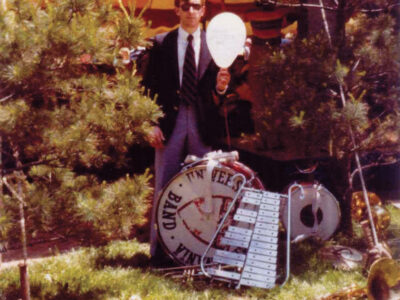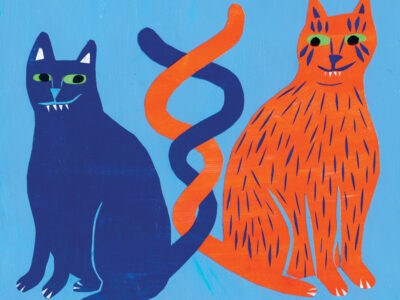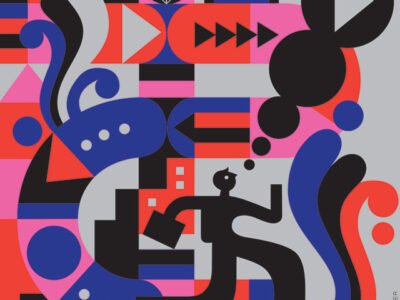
A decade after what’s believed to be the country’s first support group for gay college athletes was started here on campus, Penn alumni, students, and staff are at the forefront of a national movement to ensure that, if you’re gay and you play sports, you don’t have to be afraid.
BY DAVE ZEITLIN | Photography by JJ Tiziou
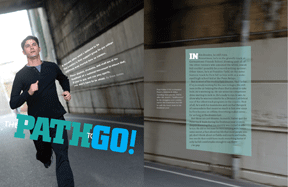
In his dreams, he still runs.
Sometimes, he’s on the gravelly track at Germantown Friends School, blowing past all of the other runners who assumed the white, Jewish kid couldn’t possibly be a record-setting sprinter. Other times, he’s at Franklin Field, on the same historic track he first fell in love with as a wide-eyed high school kid at the Penn Relays.
But in most of his track & field dreams, Paul Farber C’05 is simply waiting for the race to begin, the stillness in the air belying the chaos that is about to take hold. He’s warming up. He can sense his competitive drive starting to kick in. He’s ready to run, to win, to show why he was recruited to be a Division I athlete at one of the oldest track programs in the country. Best of all, he’s with his teammates and can feel the spirit of camaraderie that meant so much to him ever since he first became an athlete. Everything makes sense … for as long as the dreams last.
But those are just dreams. In reality, Farber quit the Penn track team during his freshman year in 2002, despite knowing that his identity was rooted in athletics. He did so because he was carrying with him a semi-secret, a fact about his life that most people simply don’t think about on fields and courts and tracks, two words that could have made everything better if only he felt comfortable enough to say them:
I’m gay.
In almost every other context, Farber has never had much of a problem being open about his sexuality. He had come out to his high-school track teammates, to his family, to his old friends from childhood and his new friends at Penn. But he stopped short of telling his entire college team that he was gay when the first word he heard coming out onto the track for the first time was faggot. It wasn’t directed at him, but that didn’t matter.
“It’s just in the air you breathe,” he says, “and it immediately put a halt to my coming-out process.”
Feeling distraught, Farber went to then-coach Charlie Powell, who retired in 2011 after 30 years at Penn, and explained his situation. Powell suggested two options: come out to the whole team tomorrow or keep silent and prove himself on the track. Farber then asked him if he had ever coached any openly gay athletes, to which he remembers Powell responding: “Oh yes, I had at least three. Two came out to the team and everything was great, and one ended up getting in a physical fight with his teammates. So make sure you do the right thing.” For Farber, that last sentence hung in the air, chilling the room. Make sure you do the right thing? He left the meeting even more distraught than when he had come in, stung by the fact that he didn’t feel more support from a man he respected so much.
“It’s important for me to say this: I don’t think he had malice,” Farber says now. “I think he was just unaware of what to do. And indifference was dangerous.”
For a couple of months, Farber tried his best to bury his secret and “prove himself” on the track. He loved to run, ever since he raced his father to the door of his preschool class (“I would win,” he says) and wore his older brother’s track jersey in elementary school. Maybe this was something he could do. Maybe he could abide by his motto of “Winners never quit and quitters never win” while keeping his sexual orientation tightly locked away whenever he was at practice or meets. “For me, being an athlete was something I knew how to do much more than I knew how to be gay,” he reasoned. But this battle was nothing like the ones he waged on the track, and it was not something he could beat. He felt alone. He felt helpless. And he was losing this race very badly.
“Running, which had filled me up, was leaving me so empty,” Farber says. “And it was affecting my performance on the track. I had to break every rule I had about being an athlete—you don’t stop; you keep pushing. I had to make a really hard decision to save myself.”
So he stopped running.
But he started something else: a group designed for people like him.
Along with co-founder Karrie Moore C’06, an openly gay member of the women’s lacrosse team, he called the group Penn’s Athletes & Allies Tackling Homophobia (PATH). It’s believed to be the first and longest-running collegiate gay athlete support group in the country, and in many ways, it started a movement—one that gains steam every day, one that can be felt at Penn perhaps more than anywhere else in the country, and one bearing a simple message above all else:
If you’re gay and you play sports, you don’t have to be afraid.

Time to GO!
Almost a decade after founding PATH, Farber sits in a room in Houston Hall, waiting for an ambitious offshoot of his group to sprout its wings. In the third row of the same room, a woman with short-cropped brown hair sits beside a woman with red hair tightly wrapped in a ponytail. The brunette puts her right hand on the redhead’s leg. The redhead rests her left arm on the brunette’s shoulder. They’re laughing. They look comfortable. All around them, there are other same-sex couples and gay athletes who look the same, as if they can feel a groundswell of momentum that may finally give them a level playing field.
The woman standing at the front of the room makes all of those good vibes seem justified, especially when she confidently declares, “We’re not going to wait for the pro athletes to come out. Now is the time!” As those words roll off her tongue—so decisively, so boldly—it becomes clear why, as an out track star at Penn, she was a leader in PATH, and why today she is the executive director of GO! Athletes, the first national network for openly gay athletes and a group that held its official relaunch event at Houston Hall on October 11 (National Coming Out Day).
But Anna Aagenes C’10 didn’t always feel so self-assured. In high school, she did what so many other athletes had done before her: she closeted her sexuality when she was around her teammates. Doing anything different just felt unnatural. In many ways, coming out to her team didn’t even feel necessary.
“Even as someone who’s both LGBT and a lifelong athlete, I separated those worlds in my head,” she says. “And I wanted them to be separate. As I evolved, I saw the need. But the reason it took until 2003 to have the first college start a group is because whenever I tell people about our organization, the first response is, ‘Huh, I never thought about that.’”
Away from the track, though, it was all Aagenes could think about. She started questioning in middle school if she liked women and began dating a girl from a different school when she was a junior at Central Bucks West High. At the end of that school year, she decided to take her girlfriend to junior prom, and as she walked into the party, wearing a blue sparkly mermaid dress, she felt all eyes on her, just like in the movies. But she didn’t run away. She didn’t hide behind friends. She danced and she had fun and she ended up writing her Penn application essay on the experience, which she calls “one of the most rewarding yet terrifying things I did in my life.” The essay question practically beckoned her to write about it: Describe a moment when you did something you were unsure about but now you know was the right decision.
“People say, ‘Oh, it was so brave of you to come out that early,’” says Aagenes, who identifies as bisexual. “My response is often, ‘I’m just a bad liar’ … When it came down to going to prom, it felt like a lie to bring a guy or to go with friends and not my girlfriend.”
Early on, Aagenes decided that she would be just as open and honest when she got to college. She looked for cues that her future school—and most importantly, its athletic department—would be LGBT-friendly, and she got one at Penn when the runner she stayed with on her recruiting trip casually mentioned that she had a couple of friends who were gay. “It was a small, simple thing, but to me it meant the world,” says Aagenes, who, upon arriving at Penn, immediately came out to the rest of the women’s track team. She didn’t go to PATH meetings right away, but joined the Queer Student Alliance and in 2008 planned the first Pride Games, a field day competition designed to bring together athletes, allies, and members of the LGBTQ (lesbian, gay, bisexual, transgender, and queer) community. It featured some events you might remember from your childhood (like a balloon toss and an eating contest) and some you probably don’t (like the featured “drag race,” which involved everyone racing to put on dresses and lipstick).
“It grows every year, which is really exciting,” Aagenes says. “People look forward to the Pride Games. They remember who won last year. But there are always people that complain about cheating because it’s really hard to enforce a three-legged race.”
Following the success of the first Pride Games, Aagenes met with Farber and soon became the PATH chair, all while setting multiple school records as the captain of the women’s track and cross-country teams. Because of all she accomplished while at Penn, the leaders of Our Group Athletes (which was born in 2008 to create a safe space for gay athletes across the country and later became GO! Athletes) reached out to her in 2010 shortly after her graduation to see if she would continue her activism on a national scale. She said yes, and two years later packed her bags for Portland, Oregon, for the first-ever Nike LGBT Sports Summit, where she represented Our Group and met with some of the most well-known LGBT advocates in the country.
Just a few months after that, Aagenes set up the relaunch event to change the group’s name to GO! Athletes, which she and her fellow board members hope will increase visibility and attention for the network, whose stated mission is to “educate, engage and empower every generation of LGBTQ athletes and allies.” The featured speakers at the event were Brian Sims, the first openly gay college-football captain, who was recently elected the first openly gay state legislator in the history of the Pennsylvania General Assembly; Joanna Lohman, a gay professional women’s soccer player; and Daniel Gutnayer W’13, a Penn swimmer who came out to his entire team to terrific results.
“The best thing was seeing people connect with each other,” says Aagenes, adding that some came all the way from California just to be there for the event. “I think it’s so important for people to know that there are others like them out there that have faced similar struggles with coming out in the world of sports.”
Unfortunately, there still aren’t many people like Gutnayer, who is one of just a select few openly gay athletes currently at Penn. But there was another one in the audience that night, a tennis player whose own coming-out story is as triumphant as any championship.
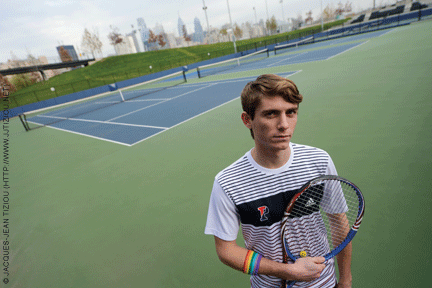
The Big Gay Elephant in the Room
Jason Magnes C’13 sits at a window table at the Barnes & Noble Café inside the Penn Bookstore, sipping a grande chai tea latte. He ties the drawstring of his gray Penn Tennis sweatshirt in a knot, then unties it, then ties it again. When the conversation turns to how his homosexuality became an open and comfortable topic among his teammates, the College senior stops fiddling and leans in a little bit closer.
“I love this story,” he says, “but it’s kind of offensive to some people.”
It starts during winter break of his freshman year. After coming out to some of his friends at Penn, Magnes decided the whole process was just too exhausting and that he would instead go the Facebook route, simply changing his info on the popular online social network to “Interested in Men.” But that one click of a mouse didn’t make anything easier; in fact, it led to an even more awkward situation when he returned to the tennis team for the spring semester.
“When I came back, I knew they all knew,” he says. “They all knew that I knew that they knew. But it was still this big gay elephant in the room and no one was even talking about it.”
Magnes talked to the coach at the time, Nik DeVore, who was supportive but told him not to force the conversation by making jokes. Luckily, someone else on the team did that for him—which is where the story takes the offensive turn. While Magnes chased down a drop shot one day at practice, a senior on the team shouted from the other side of the court: “Run, faggot, run!” Everybody heard it. There was silence for a split second. And then the big gay elephant disappeared in a cloud of hysterical laughter.
“I don’t know why he said it, and I honestly feel like in any other context it would have been extremely offensive,” Magnes says. “It must have been the way he said it and his reaction afterwards and just the whole culmination of events. I knew it was a joke, and that was what I wanted more than anything: to be able to joke with them about it, and have it be this thing that wasn’t so important.”
From there, the bond between Magnes and his teammates became as smooth as a perfectly placed forehand down the line. Now they ask him questions about his life, and he answers honestly. When they talk about girls, he gives them relationship advice. Sometimes, it can take an awkward turn, like when one of them wanted to go to a gay bar during a spring break trip (they didn’t go) and when two others asked him to judge who had better side abs (he brushed it off). But it’s all in good fun and, because of who he is on and off the court, Magnes has emerged as a leader that his teammates care about and respect.
“I think it’s more beneficial for them than for me,” Magnes says. “I’m getting them to start talking about it. It’s all about what people consider normal. For me to normalize being gay on the team is a huge thing—and I definitely feel like that’s what I’ve done.”
It didn’t always feel so normal for Magnes. Much earlier in his life, when he asked his Kindergarten teacher, “If you like boys more than girls, does that mean you’re gay?” his parents took him to a psychologist. His older brothers used to put the Barbie dolls he played with in the microwave or under the lawnmower. Later, while playing for the Millburn (NJ) High School tennis team, he overheard a younger teammate talking about how he had no issue with lesbians but found gay guys disgusting. He dated a girl in high school because he was afraid to come clean about his sexuality. Even today, as an openly gay athlete who’s happily in a relationship with a man, he sometimes feels wary of his surroundings, especially when he uses the words “my boyfriend.”
“Every time I say it, I’m conscious that I’m throwing something out there that is somewhat of a game-changer,” he says. “But I try to do it as nonchalantly as possible.”
It is the memory of his difficult road from a confused Barbie-playing kid to a self-aware campus leader for gay rights that fuels Magnes every day as he strives to help others overcome adversity in the same way he has. As the current head of PATH, he works with the athletic department to increase awareness among coaches, captains, and administrators. And as a senior tennis player, he wears a rainbow wristband on the court to be a potential role model to anyone who sees it and might be closeted. In a show of solidarity—and support for gay rights—Penn tennis coach David Geatz, who replaced DeVore in the summer of 2011, hopes that everyone on the team will wear similar wristbands for matches this spring.
“To have an out person on the team, it forces the culture of that team to change,” Magnes says. “Dan [Gutnayer] said the swim team culture changed since he came out. I know the tennis team culture changed since I came out.”
But those are only two of the 31 varsity teams at Penn. To reach all of the others, the athletic department, PATH, and Penn’s LGBT Center recently teamed up to do something that the University had never done before.
A Helping Hand for Coaches
When it comes to dealing with gay athletes, David Geatz is probably among the most supportive coaches in the country. He says that if he could get 10 people like Magnes every single year, he’d take them all. Magnes being gay is a “complete non-issue on our team,” he says. He got the rainbow wristband idea because he “thought it would be a neat thing for everyone to stand up and say it’s not right,” and that in the United States “we celebrate diversity.”
But as soon as Geatz got to the first-ever training seminar at Penn’s LGBT Center held for varsity coaches, he realized he still needed to grow. He had assumed one of the speakers at the seminar was a lesbian because she worked at the LGBT Center and had short hair. She wasn’t.
“I kind of felt good about myself going into the seminar,” Geatz says. “But when I left, I realized I wasn’t any of the things I thought I was. I was kind of disappointed with myself, actually.”
The experience opened the eyes of the other coaches, as well—which, of course, was the idea when Alanna Shanahan, Penn’s deputy director of athletics, went to the LGBT Center to see if they could conduct SafeZone training sessions specifically for sports. (As the center’s website describes the program, which is a joint effort with College Houses & Academic Services: “When you see the SafeZone placard outside a College House room or office, you have found a SAFE SPACE to talk about sexual orientation or gender- identity issues. Every SafeZone member has attended a 4-hour seminar and signed a contract agreeing to provide a listening ear and positive resources/referrals.”)
Erin Cross Gr’10, the LGBT Center’s associate director, and Rebecca Schept GEd’09 GEd’10, the center’s assistant director, ran the programs (which were separated for varsity coaches, assistant coaches, and members of Penn Athletics’ support staff) in October and November. Cross noted the session for the head coaches went “incredibly well,” and Shanahan, who sat in on it, agreed with that assessment.
“I just think the candor and dialogue was really encouraging,” Shanahan says. “Sometimes you worry if everyone is going to clam up and not talk and if it’s just going to be a painful two hours. This was the opposite of that.”
According to Geatz, one of the most interesting discussion points came when a question was posed: what would you do if a parent of a recruit calls you to ask if you have any “gays” on the team? There were many different answers. Some coaches admitted they wouldn’t know how to answer. Others said they would tell the parents they weren’t sure, and it’s not something that’s discussed. Others advocated answering “yes” no matter what, and if that’s a problem, well, then they shouldn’t send their kid to Penn. When he thought about it himself, Geatz realized it would be best not to discount any recruit, even if he or his family might have an issue with a gay teammate.
“A lot of people might be homophobic just because of a lack of education,” says Geatz, who in 30 years as a coach had never before been to a training seminar like this. “If you bring a homophobic person on the team, and he’s on campus and he meets a guy like Jason, he can change.”
When Cross posed that question and other difficult ones, it quickly became apparent that some coaches had never considered them before. “LGBT issues are not something that’s talked about in athletics,” Magnes says. “It’s not in a lot of people’s vocabulary. People don’t think to put those two different spheres together.” For a few, it wasn’t something they wanted to think about either. One head coach left the room after a half-hour, and there were others who “sat with their arms crossed looking down,” Cross noted. But, for the most part, the group was energized, engaged, and curious.
“We have to make sure our teams have an atmosphere in which everyone can be comfortable—that’s what I took from it,” says Steve Dolan, who this summer was named Penn’s director of cross country and track & field. “I thought it was important to stop and reflect for a bit. We think so much how to get better competitively and all of those things. But making sure the culture of our team is such that everyone is comfortable is just as important.”
In many ways, the two go hand in hand because the best teams are typically the ones where athletes don’t feel distant from their teammates. Even if there’s not any active bigotry on a team—“I personally feel explicit homophobia is very out of fashion these days,” Magnes says—it’s still important for athletes to realize that having a gay teammate doesn’t mean they will get hit on in the locker room, one of the many misguided notions about why homosexuality and sports shouldn’t mix. And it’s important for coaches to remember that there could be gay athletes on their team and, if so, a coach likely wouldn’t be able to identify one based on stereotypes of how homosexuals are “supposed” to act. (As Brian Sims, the openly gay former college-football player who spoke at the GO! event, once said, “In a man contest, I’m going to win.”)
“Occasionally we do have to focus our coaches and tell them, ‘You may not know it, but this is happening in your program, just based on statistics,’” Shanahan says. “If you can be aware and be thoughtful and create a respectful environment, that’s a big part of being successful. I think for the coaches, when you can point to the fact that if paying attention to this type of thing can help you be successful, that helps resonate with them.”
If nothing else, Penn’s coaches are now more likely to know how to deal with a gay athlete who isn’t sure whether he should come out. When asked what they would do in such a situation, both Geatz and Dolan say the kind of thing Farber wished he heard 10 years ago: they would be supportive no matter what, but that if the player needed more guidance, they would direct him or her to the LGBT Center.
“If a student-athlete on a team is grappling with the issue, some coaches feel very well-equipped to handle it,” Shanahan says. “And other coaches feel like they need a helping hand. The LGBT Center was awesome about saying, ‘We can be that helping hand.’”
The Future Generations
It’s Election Day in the United States when Farber sits down for lunch at El Rey, a trendy Mexican restaurant in Center City. By night’s end, LGBT advocates would celebrate three huge victories, with voters approving same-sex marriage for the first time (in Maine, Maryland, Minnesota, and Washington), electing the first openly gay US senator (Wisconsin’s Tammy Baldwin), and re-electing Barack Obama, the first sitting president to ever endorse same-sex marriage.
But in athletics, progress has been far slower. Certainly there have been advances recently—among them Orlando Cruz becoming the first active boxer to publicly reveal he’s gay, NFL punter Chris Kluwe emerging as a fiercely outspoken ally of the cause, and leagues invoking heavy fines and suspensions for the use of homophobic slurs. But the fact remains that there has never been a male American athlete in any of the five major professional sports (football, baseball, basketball, hockey, and soccer) to come out as gay while still playing.
For many, that fact is as statistically baffling as it is emotionally troublesome. But for Farber, there are other important things to focus on rather than that one talking point, which seems to dominate any discussion on homosexuality and sports.
“I think it will happen soon,” Farber says, between bites of an enchilada. “But sometimes the desire to see the LGBT version of Jackie Robinson undercuts the dozens of prominent athletes who have come out, and fails to account for, on the grassroots level, the next generation of professional athletes.”
And that next generation is being groomed at the college level, where Farber has seen so much change over the past 10 years. When he first started PATH, just doing any kind of event seemed like it was breaking a taboo. One of his main missions, aside from keeping the group alive, was just making sure people knew PATH existed, even if they never came to a meeting.
Since then, he’s been filled with pride to see Amanda Kammes C’05, KeAndra Dodds C’08, Aagenes, Magnes, and others take the torch from him and Karrie Moore to keep PATH’s flame burning. He hopes there will be a 10-year anniversary this spring for the group, which he believes tore down many of the walls that created what he calls “institutional homophobia” and a “culture of silence” that countless athletes had to suffer through.
“I can’t express how both pleased and inspired I am about what Anna and what Jason and what I know the future generations will do,” says Farber, who is currently a visiting instructor in the Penn Urban Studies program as he finishes his dissertation on American Culture at the University of Michigan. “It’s not just that they’ve carried forward something we started against the odds, but they’ve built on that. We’re still fighting battles, but we’re supposed to be. It’s the work of the next generation of PATH leaders that has carried this conversation forward—and that’s the most inspiring part.”
In many ways, it makes sense that colleges, which are often progressive and liberal, are leading the charge for gay athletes and that Penn is at the forefront. “College athletics have been a space of incubation for social change, and it will continue to be that way,” Farber notes. At the same time, however, there is still a long way to go. Cross, who’s worked at Penn’s LGBT Center for 14 years, says that there have been people who’ve quit their teams since Farber did because they felt uncomfortable. And the fact that there are currently fewer than a dozen openly gay athletes at Penn is, “if you look at it statistically, not quite right.”
“Culture is shifting and athletics is kind of dragging behind,” Cross says. “We don’t have utter horror stories but, at the same time, folks still don’t feel comfortable being themselves. I think this training and Alanna being so willing to work with us is really a signal. And it really is a huge shift at Penn.”
To help Penn continue that shift, Cross says the LGBT Center will offer a second voluntary training session for coaches and other members of the University’s athletic community. And Magnes hopes some of those coaches will in turn put a SafeZone sticker on their office doors. “It’s small and it’s subtle, but what kind of message is it sending to a potential closeted athlete?” says the tennis player, who also would like to plan an LGBT-friendly tailgate as well as a panel with varsity athletes during the spring semester.
Upon his graduation in May, Magnes plans to move to Minneapolis, where he recently accepted a marketing job with Target. But he hopes to continue fighting for gay rights in some capacity, perhaps even helping out Aagenes, whom he calls “an unbelievable person.”
As for Aagenes, her long-term goals include trying to get every school in the country to have a group like PATH, under the umbrella of GO! Athletes. That kind of involvement on a national scale, she believes, could end harassment, as well as the cycle of gay athletes quitting their teams because of a lack of institutional support.
“The heart of everything,” Aagenes says, “is making sure people feel safe, so they can have fun and play sports and follow their passions.”
“Sports,” she adds, “has this amazing potential to change culture. Sports is such a huge part of people’s lives.”
Farber says that he sees GO! as the “ultimate athletic conference”—in that it’s not telling teams who to recruit or what plays to run, but is creating an important infrastructure to help move college athletics forward. And for him, it felt like he had come full-circle to see the group hold an event at Houston Hall, exactly 10 years after he started a group of his own on the same campus.
“We were part of a movement,” he says, “before we even knew a movement existed.”
Since leaving Penn, Farber has continued to be a part of that movement. He helped start a similar group at the University of Michigan called the Michigan Athletes and Allies Partnership while he was a teaching assistant for a course in the history of college athletics. In the future, he says, he will continue to work on issues of social justice, including LGBT athletics, by working with campus groups.
He quit something that meant a lot to him once. He’s not going to do that again.
Dave Zeitlin C’03 writes frequently for the Gazette and oversees the magazine’s sports blog.


